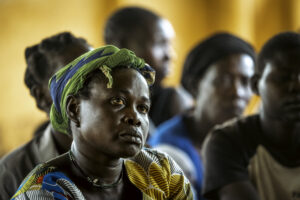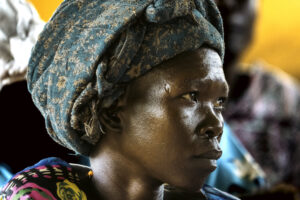Each Valentine’s Day we are bombarded by images of romantic love. Yet, there is another form of love that isn’t often rewarded by chocolates, flowers or cards – the love and sacrifice demonstrated by caregivers. Their devotion is often needed every day, at all hours. Around the world it is a duty performed mainly by women.
The love that asks no questions, the love that stands the test…
The love that never falters, the love that pays the price.
Those words come from a poem by Cecil Spring Rice, written about the sacrifice made by millions of soldiers during World War 1. It may be familiar because it was set to music by Gustav Holst, borrowing from his Jupiter movement of The Planets.
Caring For Caregivers
Not surprisingly, sacrifice is often associated with war. However, at Network for Africa we witness a less celebrated sacrifice that continues around the clock for years and even decades: caring for the physically or mentally disabled or those who are unwell.


© Simone Fior
Today, Network for Africa salutes those caregivers. Our partners in Sierra Leone (Conforti), Uganda (BNUU) and Rwanda (SURF) know that caring for someone with epilepsy or mental illness is particularly demanding. It is even more challenging when families are so poor that they struggle to survive. For this reason, our projects strive to provide the following:
– psychotherapy and trauma counselling, caring for the caregivers,
– mutual support groups where caregivers get strength from knowing they are not alone,
– training in livelihoods activities that provide an income, and
– educating the wider community to understand mental illness and epilepsy.
Observations From Caregivers
In the words of Richard from northern Uganda:
People who are caregivers can become depressed, feeling isolated.
Finally getting medication for a child with epilepsy needing constant attention made an enormous difference to his life.
Now I can go to work. Now we eat twice a day, sometimes even three times a day. I can buy malaria medicine, too.
Judgment and stigma from uninformed individuals can be hard to bear. Sarah, another caregiver in northern Uganda, describes the impact of having counselling from our partner, BNUU, and being part of a supportive group:
Even if someone tries to say something that should annoy me, I now know how to handle it. I just ignore it and move on happily.
For this reason, BNUU does continual community education to fight ignorance and superstition.
We thank our generous supporters for making this work possible. We know there are many worrying conflicts in the world today, demanding your attention. We are grateful that you are sticking with us as we offer a helping hand to people who are helping themselves. To support our work, please visit our donation page.